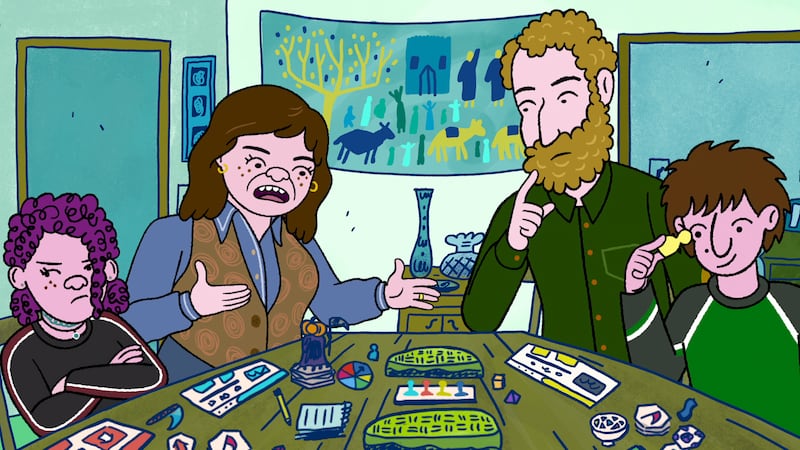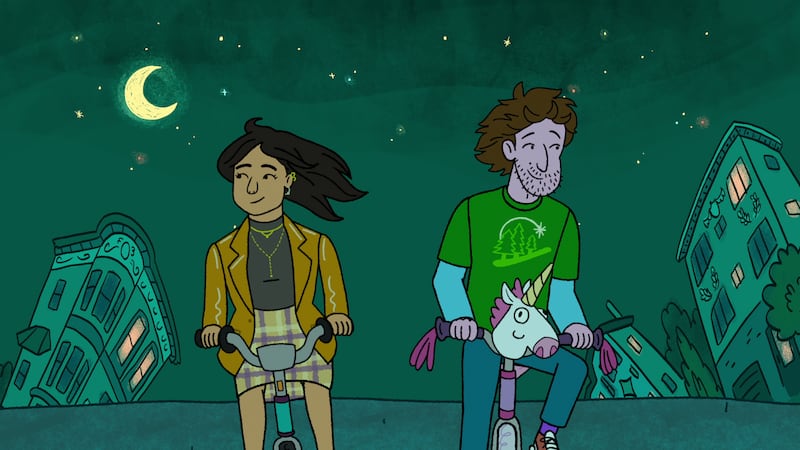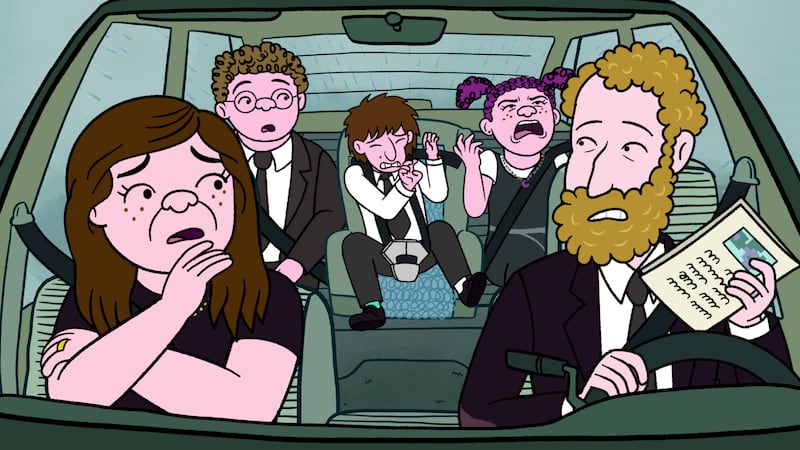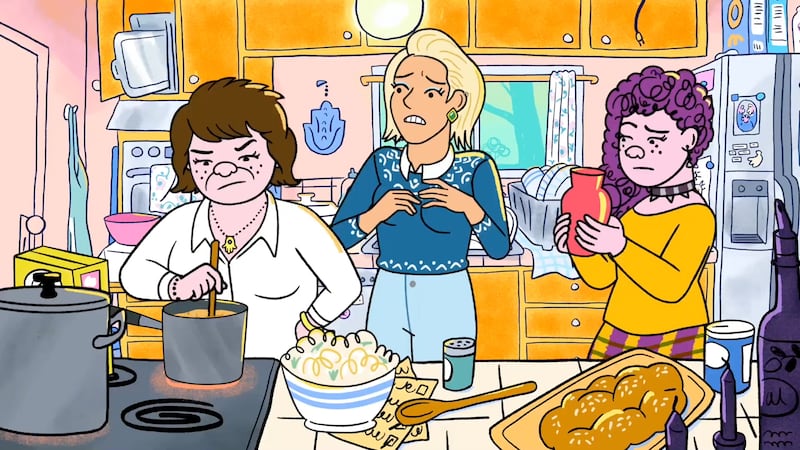Unlike other towering figures of the animated-sitcom world like Matt Groening, Seth MacFarlane, or Mike Judge, Raphael Bob-Waksberg is in the odd position of having created multiple cartoon shows without a background as an animator.
This lends his output an impressive eclecticism: Bojack Horseman, which looks a bit (but doesn’t much act) like Mike Judge’s style of light, clean-line caricature; Undone, a rotoscoped marvel befitting its trippy subject matter; and now Long Story Short, a time-hopping family saga that feels a bit like a flip through a particularly active and whimsical sketchbook, with playful loops of curly hair and scribbles of handmade-looking details.
Long Story Short, debuting on Netflix Aug. 22, also brings to mind both graphic memoirs and traditional novels, an ambitious project that makes better use of an episodic structure than many of its Netflix brethren.
The show follows the lives of the Schwoopers, a trio of Jewish siblings named for a portmanteau of good-natured father Elliot Cooper (Paul Reiser) and overbearing mother Naomi Schwartz (Lisa Edelstein). Avi (Ben Feldman), the eldest, is a religion-skeptical music geek; Shira (Abbi Jacobson) is the combative middle child; and Yoshi (Max Greenfield) is the feckless youngest.

We see all three from childhood to (at least in the older two sibs’ case) middle age, but not chronologically; different episodes skip between time periods, and often include their own flashbacks that further inform the stories at hand. All told, the show covers around 30 years of the family’s life, expanding to include in-laws, family friends, and more distant relations.
It’s a device that allows for sitcom-style episodes firmly structured around single events—a school play, a new job, a funeral, an intervention—while eschewing bad exposition in favor of a more novelistic approach. Major events like deaths and divorces are often first referred to in passing during an episode set well after the fact.

The show centers the family’s Jewishness in a knowing, multifaceted way that appears to be autobiographical. (Bob-Waksberg’s family was heavily involved in the Jewish community around their California home, just like the family on the show.) Meaningfully, Long Story Short focuses on American cultural Jewishness more than religious beliefs, flowing back to the willfulness of Naomi, who obviously wants her kids practicing Judaism in precisely the way she’s come to understand it. (In fact, some of the characters’ reactions to more adherent forms of the religion are hilariously baffled or dismissive.)
At the same time, Naomi’s Jewish-mom shtick, particularly her passive-aggressive relationship with Avi’s eventual wife Jen (Angelique Cabral), may feel familiar even to those outside of the tribe. For all of the show’s ambition and emotional realism, it sometimes feels muddled between its serious family dynamics and broader, cartoonier farce, with the cliches of the latter bleeding into the former.
The episodes are rarely short of funny lines, often running into each other and piling up in a purposefully cacophonous overlap. (Again, Bob-Waksberg reaches beyond typical TV formulas and seems, at times, to pull from live theater.) Some bigger ideas, though, tend to be run into the ground, or, on the other side, underdeveloped.

When the timeline crosses into the 2020s, for example, it doesn’t shy away from mentioning or depicting the after-effects of the COVID-19 pandemic, and laudably, not just as an abstraction. It clearly affected these characters’ lives in major ways. But those references work better in dialogue than in bigger storytelling swings: In one bizarre episode, Avi tries to help rid his daughter’s school of wolves that have taken up residence since the pandemic-era closures. It’s a very Simpsons-y gag, only the show uses it as a path toward some beyond-broad satire of the shrilly cynical parental-rights movements that bedevil so many schools.
The major characters are also drawn wearing masks in indoor public spaces for most post-2020 scenes. There’s a story reason for this—and even if there wasn’t, that’s obviously not an inherent problem. Plenty of people continued to wear masks well after the pandemic was prematurely declared over; it’s another example of the show’s attention to period detail, whether that period is typified by late ’90s youth culture, a post-9/11 prom, a past-peak Arcade Fire in 2014, or masking in 2022.
But when every one of the likable main characters uniformly (and, as far as the audience ever sees, silently) agree on this point, it feels like Bob-Waksberg is attempting to model good behavior more than offer specific characterization. It’s kind of neat to see masking acknowledged as something people might do past the earliest months of 2021, but how many quarrelsome multi-generational families of 10 members or more would find themselves in absolute lockstep about this one issue? The show’s earnestness sometimes masks a lack of truly surprising insight.

Yet like a novel with frustrating passages that is nonetheless difficult to put down, the sheer time-hopping scale of Long Story Short pulls you through its 10 episodes. Some of the unlikeliest conceits turn out to rank among the show’s best, like an episode where Yoshi reconnects with someone from his past while doing his damndest to not screw up a favor for Shira—a mini-rom-com and sibling psychodrama rolled into one.
As individual episodes rise more than falter, it makes increasing sense that the show has already been renewed for a second season. Without resorting to cheap cliffhangers, Bob-Waksberg and his writers still leave you wanting to know where the Schwoopers go next.
The post ‘Long Story Short’ Will Be Netflix’s New ‘Bojack Horseman’ appeared first on The Daily Beast.




